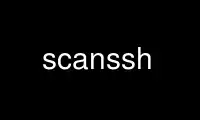
This is the command scanssh that can be run in the OnWorks free hosting provider using one of our multiple free online workstations such as Ubuntu Online, Fedora Online, Windows online emulator or MAC OS online emulator
PROGRAM:
NAME
scanssh — scans the Internet for open proxies and SSH servers
SYNOPSIS
scanssh [-VIERph] [-s scanners,...] [-n ports,...] [-u socks hosts,...] [-e excludefile]
addresses...
DESCRIPTION
ScanSSH scans the given addresses and networks for running services. It mainly allows the
detection of open proxies and Internet services. For known services, ScanSSH will query
their version number and displays the results in a list.
The adresses can be either specified as an IPv4 address or an CIDR like IP prefix,
ipaddress/masklength. Ports can be appended by adding a colon at the end of address
specification.
Additionally, the following two commands can be prefixed to the address:
random(n[,seed])/ The random command selects random address from the address range
specified. The arguments are as follows: n is the number of address to
randomly create in the given network and seed is a seed for the pseudo
random number generator.
split(s,e)/ The split command is used to split the address range in several unique
components. This can be use to scan from serveral hosts in parallel.
The arguments are as follows: e specifies the number of hosts scanning in
parallel and s is the number of the host this particular scan runs on.
The options are as follows:
-V Causes scanssh to print its version number.
-I Does not send a SSH identification string.
-E Exit the program, if the file containing the addresses for exclusion can not
be found.
-R If addresses are generated at random, this flag causes the program to ignore
excluded addresses from the exclude file. The default behaviour is to
always exclude addresses.
-p Specifies that ScanSSH should operate as a proxy detector. This flag sets
the default modes and default scanners to detect open proxies.
-h Displays the usage of the program.
-n ports,... Specifies the port numbers to scan. Ports are separated by commas. Each
specified scanner is run for each port in this list. The default is 22.
-u socks hosts,...
A list of comma separated host:port pairs of SOCKS proxies that scanssh
should use to scan through.
-s scanners Specifies a number of scanners should be executed for each open port.
Multiple scanners are separated by commas. The following scanners are
currently supported:
ssh Finds versions for SSH, Web and SMTP servers.
socks5 Detects if a SOCKS V5 proxy is running on the port.
socks4 Detects if a SOCKS V4 proxy is running on the port.
http-proxy Detects a HTTP get proxy.
http-connect Detects a HTTP connect proxy.
telnet-proxy Detects telnet based proxy servers.
-e excludefile Specifies the file that contains the addresses to be excluded from the scan.
The syntax is the same as for the addresses on the command line.
The output from scanssh contains only IP addresses. However, the IP addresses can be
converted to names with the logresolve(8) tool included in the Apache webserver.
EXAMPLES
The following command scans the class C network 10.0.0.0 - 10.0.0.255 for open proxies:
scanssh -p 10.0.0.0/24
The next command scans for ssh servers on port 22 only:
scanssh -n 22 -s ssh 192.168.0.0/16
The following command can be used in a parallel scan. Two hosts scan the specified networks
randomly, where this is the first host:
scanssh 'random(0,rsd)/split(1,2)/(192.168.0.0/16 10.1.0.0/24):22,80'
Use scanssh online using onworks.net services
